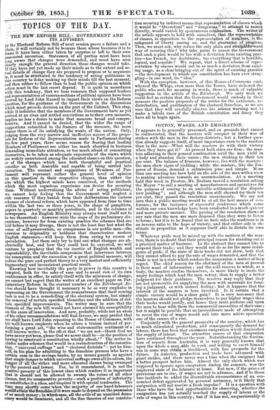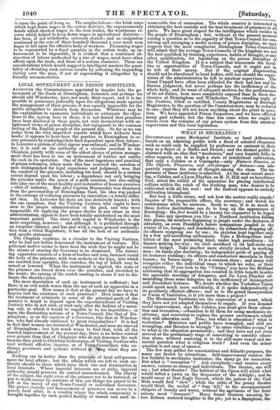COTTON, WAGES, AND EMIGRATION.
Ix appears to be generally presumed, and on grounds that cannot be controverted, that the masters will conquer in their war of strikes with the men in the factory-districts ; but a further ques- tion already suggests itself, of more importance even to the masters than to the men—What will the masters do with their victory when they have got it? At present both sides are firm ; the mas- ters adhering to their general combination until the men yield in a body and abandon their union ; the men sticking to their ten per cent. The balance of firmness, however, lies with the masters : the men show signs of yielding; while the masters, like the Em- peror of Russia, demand a submission pure and simple. More than one meeting has been held on the side of the men with a view to making advances towards an accommodation. At a meeting held this week in Preston, Mr. Braham moved a resolution asking the Mayor "to call a meeting of manufacturers and operatives for the purpose of coming to an amicable settlement of the dispute now pending" ; and although the men still cheered for their ten per cent, they passed the resolution unanimously. We are not sure that a public meeting would be at all the best means of con- ference; for the instances of successful conference which come within our own knowledge have been conducted in a much quieter and more private manner. The passing of the resolution shows at any rate that the men are more disposed than they were to listen to terms ; butit is to be feared that on both sides the readiness is in an inverse ratio to the hope of victory, and that either side is ob- stinate in proportion as it supposes itself able to dictate its own terms.
Whatever pride may be mixed up with the motives of the mas- ters, there-is no doubt that their principal reason. for standing out is a practical matter of business. In the abstract they ("linnet like to suspend their trade ; and they would not do so for the mere indul- gence of pride, if the state of their books did not show, both that they cannot afford to pay the rate of wages demanded, and that the trade is not in a state which renders the suspension a matter of deep regret. The chief reason for the obstinacy of the men at present is their want of information ; and the cold reserve to which, as a body, the masters confine themselves, is more likely to incite the angry feelings which lead the men astray, than to supply a better judgment for their guidance. The masters may reply that they are not answerable for supplying the men with materials for form- ing a judgment, or with correct feeling ; but it happens that the interest of the masters is here involved. Is it certain that a simple victory would be a dear gain ? It is very necessary that the masters should not pledge themselves to pay higher wages than their books would justify, and hence they must perforce call upon the men to bear with them the commercial necessities of their ease ; but it might be possible that an inconsiderate mode of attempting to resist the rise of wages would call into more active operation one of the causes of a rise.
Conjointly with the general prosperity of the country, which has so much stimulated production, and consequently the demand for labour, there has been that enormous emigration which diminished the supply of labour. The attractive causes of that emigration have continued throughout the year. Notwithstanding the fluctua- tion of reports from Australia, it is very generally known that upon the whole a ma3„able to work and willing to exert himself can in some way obtain a livelihood, with fine prospects for the future. In America, production and trade have advanced with giant strides, and there never was a time when the emigrant had a better ',respect before him. Almost the only check which was supposed to operate upon emigration during the summer, was the improved state of the labourer at home. But now, if the prices of provisions are to rise, if wages are not to advance, and if to those two incidents be added the discreditable circumstances of -an eco- nomical defeat aggravated by personal acrimony, is it likely that emigration will not receive a fresh impulse? It is a question 'with those who have the best opportunities for observing, whether the emigration has yet actually touched the supply .of labour or the rate of wages in this country ; but if it has not, unquestionably it
is upon the point of doing so. The surplus labour—the Irish corps which kept down wages in the cotton districts, the supernumerary hands which checked wages in the iron trades, the workhouse re- serve which helped to keep clown wages in agricultural districts— has been, if not withdrawn, seriously abated ; and an emigration continued at the rate of three hundred thousand a year must soon begin to tell upon the effective body of workers. Presuming wages to be represented by a fixed quantity in the cotton trade, an en- hancement to be impossible, it is evident that a continued ab- straction of labour unchecked by a rise of wages, must have other effects upon the trade, and those of a serious character. These are considerations which would suggest to intelligent masters the possi- bility of obviating such serious results by softening the impending victory over the men, if not of superseding it altogether by a friendly accommodation.



























 Previous page
Previous page